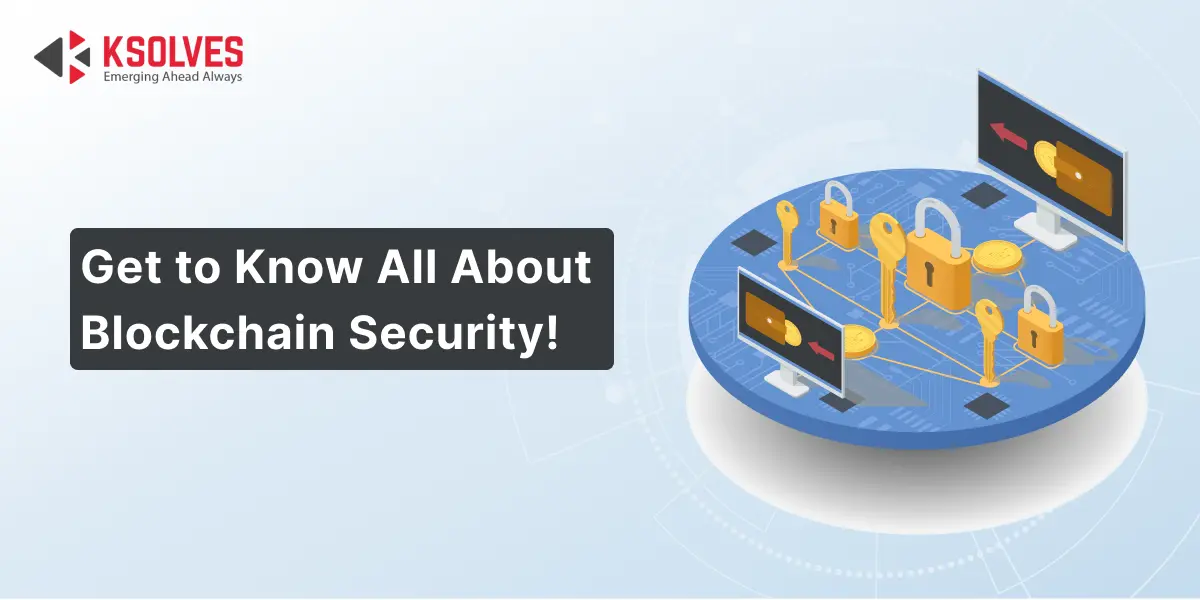Get to Know All About Blockchain Security!
Blockchain
5 MIN READ
January 12, 2024
![]()

In the past few years, Blockchain security has grabbed huge attention across the world. It works as a great tool with the capability of creating secured and temper-proof networks to make safe transactions. Blockchain is transforming the world with the power of high-end security systems.
In today’s scenario, cybersecurity has become a prime concern as it increases the rate of cyber-attack crises. Blockchain is a new technology that was designed to support Bitcoin but its popularity goes beyond the cryptocurrency.
Here in this blog, we are going to discuss blockchain security and user cases.
What is Blockchain Security?
Blockchain security encompasses cyber security principles, tools, and techniques that are used to mitigate risks, prevent malicious attacks, and thwart unauthorized access within blockchain networks. Despite the common foundation of distributed ledger technology (DLT) that underlies all blockchains, it’s crucial to recognize that not all blockchains share identical functionalities or security levels. Public and private blockchains have come up with unique merits and drawbacks, diverging significantly in their security models due to the contrasting openness or closed nature of their respective networks.
Why is Blockchain so Secure?
A Blockchain functions as a distributed database managed by a network of computers rather than a single entity. This decentralized framework enhances transparency and security by enabling each participant in the network to independently verify transactions by referencing the entire Blockchain history. To understand the mechanics of Blockchain you need to envision it as a digital ledger. In traditional ledgers, a central authority like a bank or government is responsible to oversee and manage transactions. In contrast, blockchains operate without a central authority, distributing the ledger across all network participants.
When any new transaction is added to the Blockchain it will be verified by all network participants using intricate mathematical algorithms. Once verified, a transaction becomes immutable; it can’t be altered or deleted. This immutable record forms a secure and permanent repository of all historical transactions on the Blockchain.
The decentralized nature of blockchains provides a well-suited for applications to provide outstanding levels of transparency and security, such as financial transactions or supply chain management. Consequently, the surge in Blockchain security roles and projects attests to the technology’s potential to revolutionize various industries. With its capacity to deliver enhanced security and transparency, Blockchain stands out as a pivotal technological advancement, poised to reshape our interaction with technology across diverse sectors.
Explanation of Types of Blockchain Security
Let’s break down the different types of blockchain security based on how they control access:
- Public Blockchain
Also known as permissionless, a public blockchain is open for anyone to access and add new blocks. People using it can stay anonymous. - Private Blockchain
Also called permission, a private blockchain restricts who can add new blocks and might control who can access it. Users need to be identified and authenticated. - Hybrid Blockchain
This type combines aspects of both public and private blockchains, creating a system where they can work together. It’s like having both a public and a private conversation that link up.
What Are the Key Features of Blockchain Security?
Blockchain technology plays well in boosting security levels and delivering significant value to different organizations. Here we are discussing the key features of blockchain and efficiency.
- Distributed Network: A blockchain operates on a decentralized network of interconnected nodes, which has been designed to eliminate any single point of failure. This architectural resilience significantly heightens the complexity for potential adversaries seeking to disrupt the network intentionally or tamper with critical organizational data.
- Transparency: Blockchains inherently embody transparency in each transaction, a characteristic ingrained in every node within the network. This enables seamless monitoring of all transactions by all nodes and plays a key role in deterring fraudulent activities. It ensures universal access to consistent information for all participants.
- Consensus Mechanism: The blockchain encompasses a group of computers (nodes) that work together to check and agree on each transaction. This teamwork guarantees that every transaction is correct and transparent for everyone to see.
- Cryptography: The security and validation of transactions within a blockchain completely depend on the application of sophisticated mathematical algorithms. Due to the encryption Altering the data is nearly impossible because each transaction is encrypted and intricately linked to the one that precedes it.
Blockchain Security Use Cases
Blockchain security unfolds a realm of practical applications that represents its versatility in enhancing various facets of our digital landscape. Let’s explore some compelling use cases:
- Supply Chain Management: Blockchain emerges as a game-changer in supply chain management. By securely and transparently tracing the journey of goods from origin to destination, it significantly elevates the efficiency of supply chain processes. The blockchain’s inherent ability to record every transaction ensures easy determination of a product’s origin and authenticity.
- Identity Verification: Blockchain’s decentralized and secure framework becomes a reliable option for confirming the identities of individuals and organizations. This capability proves invaluable in sectors like voting, banking, and healthcare, where establishing identity with certainty is paramount.
- Smart Contracts: Enter the world of smart contracts—programmable agreements that autonomously execute predefined tasks based on specific conditions. Using blockchain’s secure and transparent features taking advantage of the secure and transparent features of blockchain, smart contracts are used in various areas like real estate, insurance, and finance. They provide a dependable and efficient way to carry out tasks.
Best Practices For Building Blockchain Security Solutions
To ensure the complete security of blockchain solutions you should incorporate some key best practices that include-
Robust Authentication and Access Control: Strengthen the access points to your blockchain network by employing robust authentication methods. Multi-factor authentication (MFA) and role-based access control (RBAC) mechanisms ensure that only authorized personnel can engage with the network.
Encryption for Data and Communications: Protect valuable data on the blockchain while it moves between nodes by using encryption technology. This ensures that even if there’s a security breach or unauthorized access, unauthorized users won’t be able to easily get to or understand the sensitive information.
Code Audits and Smart Contract Testing: Because vulnerabilities in smart contracts can have significant consequences, it is crucial to conduct regular code audits and comprehensive security testing. Prompt identification and resolution of weaknesses in smart contract code are essential to avoid potential security breaches.
Decentralization and Consensus Mechanisms: You need to boost security by incorporating decentralized consensus mechanisms such as Proof of Work or Proof of Stake. Utilizing distributed networks offers heightened protection by removing the vulnerability of a single point of failure that strengthens your network against a range of potential attacks.
Regular Updates and Patch Management: Stay proactive in safeguarding your blockchain platform by keeping it up to date with the latest security patches and updates. Timely updates are crucial in defending against potential vulnerabilities and thwarting attacks from malicious entities.
By adhering to these best practices, organizations can establish a resilient and secure foundation for their blockchain solutions, mitigating risks and ensuring the integrity of their systems.
Wrapping Up
In summary, blockchain security has the power to change how finance, supply chain, healthcare, and more work securely and transparently. As technology grows, focusing on improving blockchain security making blockchain security better is crucial for fully realizing the potential of this game-changing technology. It’s about building a digital world that’s safe, trustworthy, and full of possibilities.
If you’re seeking to fortify your business security through professional Blockchain Consulting Services, Ksolves is your trusted partner. Our experts specialize in delivering professional Blockchain services designed to enhance your security systems. Reach out to our dedicated Blockchain Experts to initiate a discussion about your project requirements. Secure your business’s future with Ksolves – your go-to solution for top-notch Blockchain services.
![]()





Author
Share with